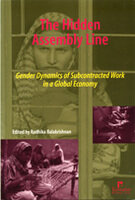ABOUT
Radhika Balakrishnan is a Professor Emeritus at Rutgers University and was a Professor of Women's and Gender and Sexuality Studies from 2009-2024. She holds a Ph.D. in Economics from Rutgers University. Formerly, she held the role of Faculty Director at the Center for Women's Global Leadership (CWGL) at Rutgers. Radhika currently sits on the board of the Global Initiative of Economic, Social, and Cultural Rights (GI-ESCR) and is a member of the Global Future Council on the Future of the Care Economy. Throughout her career, her roles include serving as a Commissioner for the Commission for Gender Equity for the City of New York and participating in the Global Advisory Council for the United Nations Population Fund. She was President of the International Association for Feminist Economics (IAFFE) from 2020 to 2021. She has chaired the Board of the United States Human Rights Network and the Board of the Center for Constitutional Rights. Her prior academic experience includes a Professor of Economics and International Studies position at Marymount Manhattan College from 2003 to 2009. Additionally, she contributed her expertise to the Ford Foundation as a program officer in the Asia Regional Program from 1992 to 1995.
Radhika Balakrishnan is the co-author of Rethinking Economic Policy for Social Justice: The radical potential of human rights with James Heintz and Diane Elson (Routledge, 2016). She is the co-editor with Diane Elson of Economic Policy and Human Rights: Holding Governments to Account (Zed Books, 2011). She edited The Hidden Assembly Line: Gender Dynamics of Subcontracted Work in a Global Economy (Kumarian Press, 2001) and co-edited Good Sex: Feminist Perspectives from the World’s Religions, with Patricia Jung and Mary Hunt (Rutgers University Press, 2000). She is the author of Why MES with Human Rights: Integrating Macro Economic Strategies with Human Rights (Marymount Manhattan College, 2005) and has authored numerous articles in books and journals. Her research and advocacy work has sought to change the lens through which macroeconomic policy is interpreted and critiqued by applying international human rights norms to assess macroeconomic policy.






